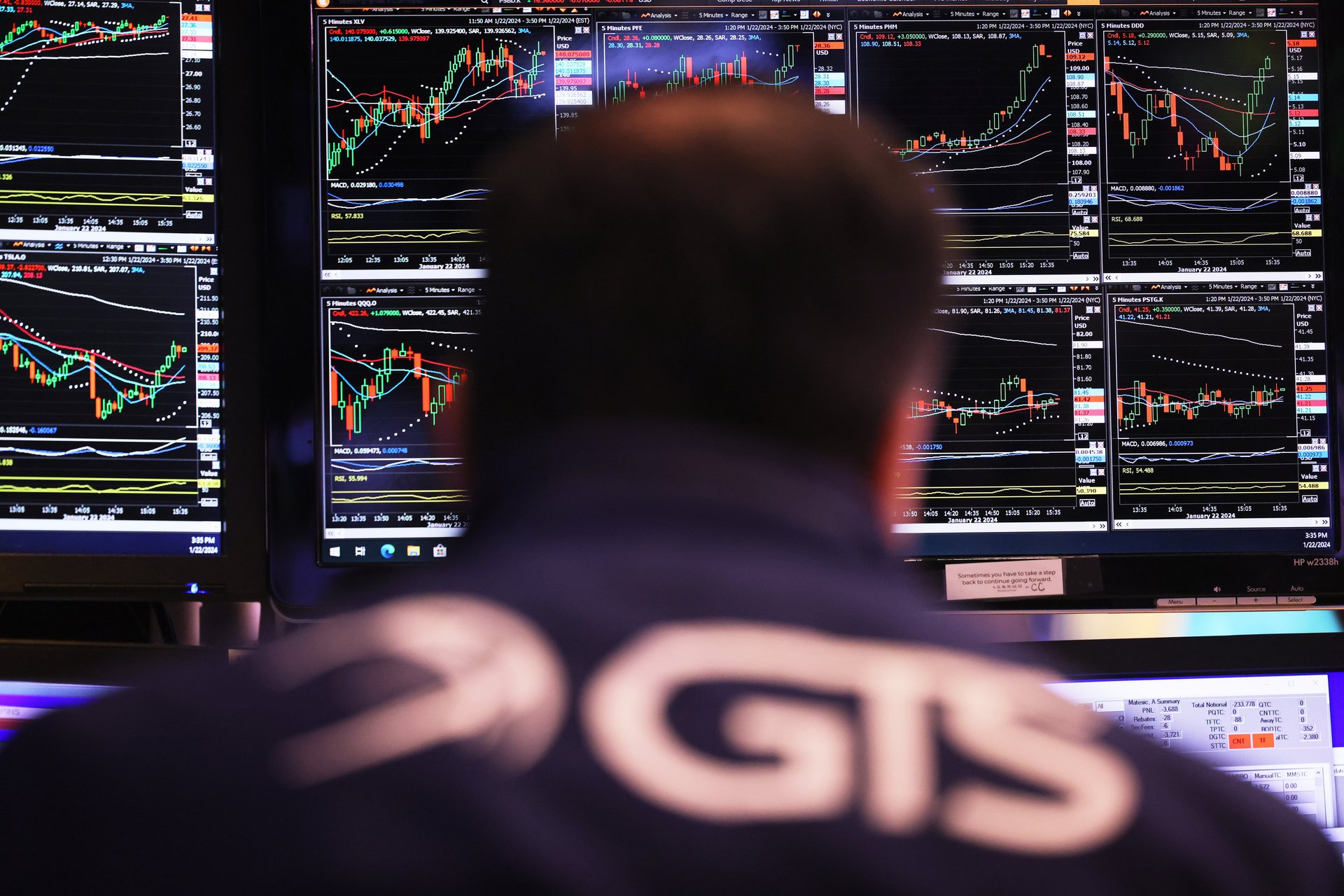🌏 A tale of two indexes
Plus: How well are Apple’s headsets selling?

Good morning, Quartz readers!
Suggested Reading
Here’s what you need to know
The Dow stock market index surpassed 38,000 for the first time. The S&P 500 also hit another record, while Bitcoin dropped below $40,000. Meanwhile, a sell-off on a Hong Kong exchange is signaling larger global pessimism about China’s economy.
Related Content
ExxonMobil sued its own shareholders over a proposal aimed at reducing emissions. It’s the first time the company has sued to block such a measure, claiming the group was “driven by an extreme agenda” that put climate goals ahead of its ability to make money.
Narendra Modi consecrated a contentious Hindu temple yesterday. The move was a key election promise of the prime minister’s Bharatiya Janata Party and could boost his chances at securing a rare third term.
Cameroon kicked off the world’s first mass malaria vaccine campaign for children. The free jabs come after a pilot of the program was successful in Kenya, Ghana, and Malawi.
Baby boomers aren’t fixing up the houses they’re hoarding
The housing market is tough today for young people living in the US. Prices are high. Interest rates are high. The savings needed for a deposit are getting eaten up by inflation, job loss, and childcare.
Unfortunately, tomorrow’s housing market isn’t shaping up to be too great, either, and a lot of blame can be placed on a generational tug-of-war. Baby boomers—who are still the nation’s biggest generational cohort of both homeowners and homebuyers—don’t plan to leave their homes or fix them up anytime soon, a new poll commissioned by renovation firm Leaf Home suggests.
Leaf Home has a stake in the survey—the company makes its money fixing gutters, doing accessibility-minded bathroom tweaks, and adding other safety features meant to help people age in place in their homes. But that doesn’t make its findings any less groan-inducing for members of Gens X through Z who were hoping to move into those homes at some point.
Apple’s Vision Pro pre-sales, by the digits
Apple’s mixed-reality Vision Pro headset may have sold out in pre-ordering—and could be poised to one day change the workplace—but, at least in the short-term, it’s still an incredibly niche product. Just take a look at the latest pre-sales data:
$3,499: Cost of an Apple Vision Pro headset
160,000 to 180,000: Headsets Apple sold after pre-order sales began on Jan. 17
60,000 to 80,000: Headsets Apple produced for its Feb. 2 launch
1.2 billion: Apple’s user base
0.007%: Share of Apple’s user base needed to buy the headset to meet its target
Pop quiz: The US isn’t among 2024’s most powerful passports
Japan and Singapore have had the most powerful passports in the world since 2019. But they’re not alone anymore.
France, Germany, Italy, and Spain have joined the two Asian countries in sharing the top spot for being able to travel to a country in 2024 without a visa, according to an annual ranking.
The US isn’t even in the top five. Where does the country with the world’s biggest economy rank?
A. 7th
B. 10th
C. 20th
D. 34th
Find the correct answer here—along with which country has climbed the list the most in the past decade.
Surprising discoveries
The cicadas are coming again, like North America’s never seen them before. Or at least, not since forever ago. (But also, calm down—that just means things are happening like they should be!)
Stanford University’s women’s basketball coach has the most wins in college basketball history. Tara VanDerveer’s stats are kind of like the cicada superbrood of victories.
Fighting blast fishing in Tanzania is a creative endeavor. No one cares that it’s against the law, so lawmakers must think outside the explosive box.
Double-dipping’s grossness factor increases when particular dips are used. A thin dip like salsa will drip a lot more of the used chip’s bacteria back into the communal dish.
A UK delivery service used an AI customer service chatbot. That is, until one frustrated customer put AI to its best use—writing bad poetry about itself—and it did not end up being good publicity.
Did you know we have two premium weekend emails, too? One gives you analysis on the week’s news, and one provides the best reads from Quartz and elsewhere to get your week started right. Become a member or give membership as a gift!
Our best wishes for a productive day. Send any news, comments, bad AI poetry, and good cicada stories to [email protected]. Today’s Daily Brief was brought to you by Morgan Haefner and Susan Howson.